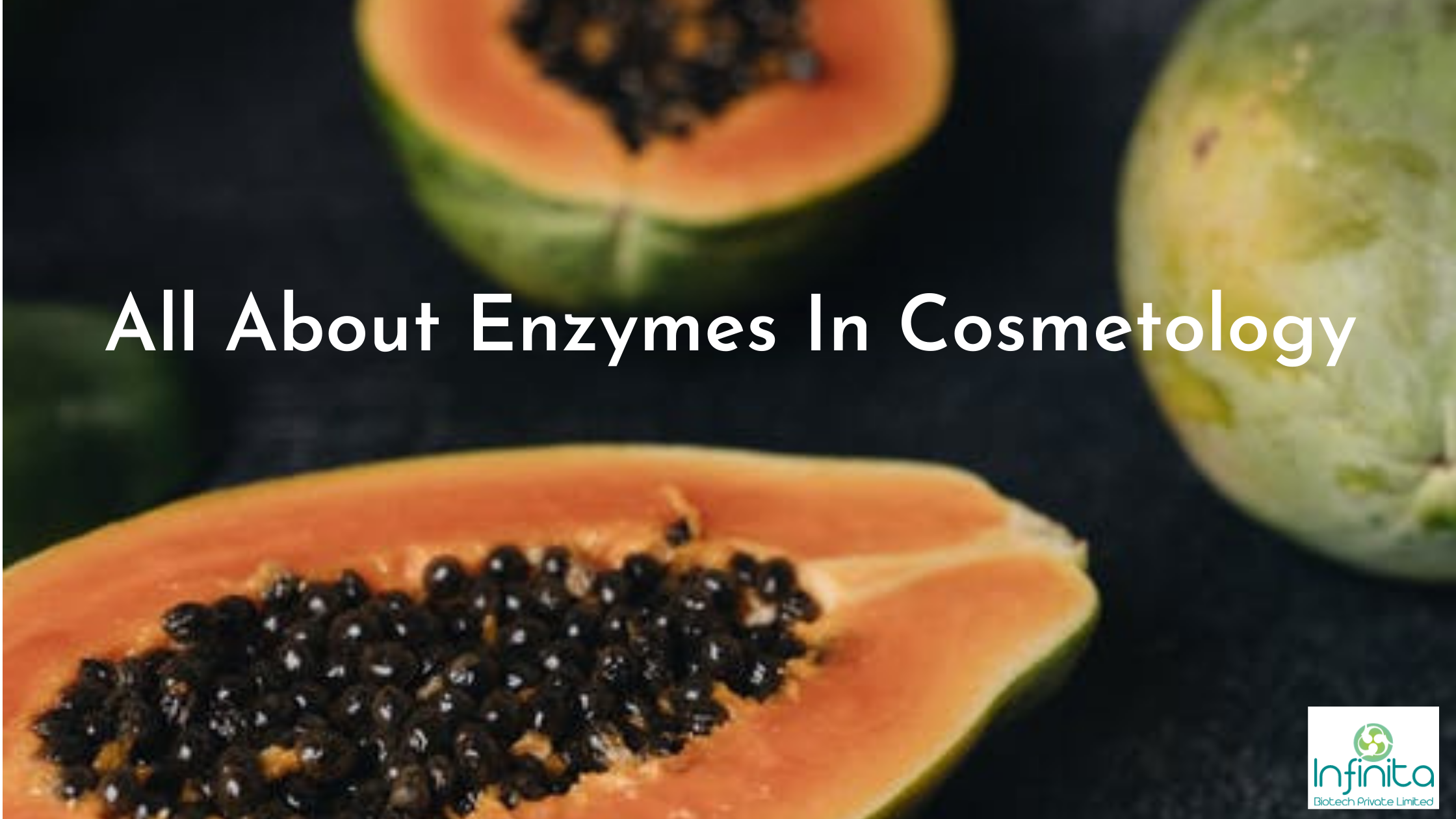
All About Enzymes In Cosmetology
All About Enzymes in Cosmetology
Enzymes are complex proteins that act as biocatalysts which increase the rate of reaction while not undergoing the reactions themselves. Without the presence of enzymes in the cells, most of the reactions would not be possible due to the temperature and Ph levels in the cells. Enzymes act as a catalyst for a particular type of reactions and specific substrates or molecules. Due to this property, there are no side effects nor any residual bi-products and one of the main reasons for use of enzymes in skin care products. There are other skin-friendly enzymes also having additional components called cofactors. These enzymes are known as coenzymes. These are mostly derived from minerals like magnesium, zinc, copper, and iron among others, and also from vitamins particularly belonging to B group vitamins which are mostly water-soluble. Some of these vitamins are niacin, calcium pantothenate, and pyridoxine hydrochloride.
Enzymes for Cosmetics
Enzymes have been used in the cosmetics industry for many years now due to their beneficial properties. Enzymes derived from pumpkins are used in cosmetics for smooth skin. Enzymes are also used in formulations to prevent acne, skin aging, and pigmentation. Enzymes are also used for exfoliation of the skin, prevention of free radicals which damage the skin and body, maintaining firm skin, and for their antibacterial properties.
Types of Enzymes in Skin Care and Their Benefits
Several types of enzymes are used in skincare routines and formulations due to their being natural, skin friendly and having no side effects. Let us look into some of the noticeable enzymes used in the skincare and cosmetics industry.
1. Coenzyme Q10
Coenzyme Q10 is one of the most important enzymes in skin care products which is naturally produced by our body. As we age, its production slows down which leads to skin aging, sun damage, and wrinkles. By incorporating this coenzyme in skin creams lead to skin rejuvenation, stimulates skin elasticity and collagen production, reduces skin damage due to sun exposure and free radicals, balances skin tone, and a lot of other benefits. Coenzymes work by enhancing the efficiency of the body’s enzymes. Another advantage of coenzymes is that they have low molecular weights and get absorbed into the skin when applied topically. Yet another advantage is that they are stable and can easily be introduced in skincare creams and formulations.
2. Superoxide Dismutase (SOD)
An article on enzymes for cosmetics can never be complete without the mention of Superoxide Dismutase or SOD. This enzyme is also found naturally in our body but its production slows down as we age. SOD is a powerful antioxidant enzyme that eliminates the free radicals and thus promotes cellular health. To get this in abundance incorporate green veggies like broccoli, cabbage, and brussels sprouts into your diet. SOD when combined with another naturally occurring enzyme catalase prevents the aging of the skin from oxidation. This is done through the dismutation process which breaks down the harmful oxygen molecules or free radicals into a less reactive form. For cosmetic industry use, SOD is usually derived from yeasts and combined with catalase in skin formulations to prevent age-related skin complications like wrinkles, liver spots, fine lines and also helps in scar tissue and keloid reduction and quicker healing of wounds.
3. Proteolytic enzymes
Proteolytic enzymes are naturally occurring enzymes found in living organisms including animals, algae, bacteria, and viruses. These are also called proteinase, protease, or peptidase. Pepsin, Bromelain, and Papain are the most common proteolytic enzymes. Bromelain and Papain are derived from Pineapple and Papaya respectively and are used as enzymes in skin care products. These enzymes work by breaking the skin-friendly proteins into peptides and then amino acids which can easily be absorbed by the skin and promote cell growth and renewal.
4. Diacylglycerol acyltransferase (DGAT-1), Lysyl and Prolyl hydroxylases
Types of enzymes in skin care also include those enzymes which promote skin firming through the formation of collagen and fat. DGAT-1 increases the action of retinoic acid which increases the skin cell and hair renewal process. Enzymes like Lysyl and prolyl hydroxylases when combined with Vitamin C, increase skin collagen which firms the skin and prevents wrinkles and fine lines.
5. Peroxidase Enzymes
Enzymes for cosmetics also include peroxidase a commonly found enzyme but for a different purpose. These enzymes preserve the skin creams and other formulations by preventing bacterial growth. These enzymes consume the oxygen present in the formulation without which bacteria cannot survive.
Conclusion
Other than the above-mentioned uses, enzymes are also used as exfoliants in raw and cream formulations to remove the dead skin cells and brighten the skin. Papaya and pineapple scrubs are quite popular as raw exfoliants. Enzymes for cosmetics are also used with salicylic acid and retinoic acid to prevent acne and improve skin tone. The uses of enzymes in cosmetics are becoming widely popular and are not only limited to skincare but also for hair care and growth and dental hygiene and several other beauty products.
BROMELAIN
Our Bromelain Enzyme is a type of protease derived from Pineapple stem.

Smooth skin

Depigmentation

Tightens skin
PAPAIN
Our Papain Enzyme is a type of protease derived from Papaya.

Removes Acne

Removes dead skin

Skin exfoliation
Related Articles
The Basics of Soil Stabilization: An Introduction
What is Soil Stabilization? Definition: Have you ever wondered how builders manage to create rock-solid foundations for structures, even on unstable grounds? That's where soil stabilization becomes critical. At its core, soil stabilization refers to the process of...
Bio Enzyme Uses and Their Applications

All About Enzymes In Cosmetology
All About Enzymes in Cosmetology
Enzymes are complex proteins that act as biocatalysts which increase the rate of reaction while not undergoing the reactions themselves. Without the presence of enzymes in the cells, most of the reactions would not be possible due to the temperature and Ph levels in the cells. Enzymes act as a catalyst for a particular type of reactions and specific substrates or molecules. Due to this property, there are no side effects nor any residual bi-products and one of the main reasons for use of enzymes in skin care products. There are other skin-friendly enzymes also having additional components called cofactors. These enzymes are known as coenzymes. These are mostly derived from minerals like magnesium, zinc, copper, and iron among others, and also from vitamins particularly belonging to B group vitamins which are mostly water-soluble. Some of these vitamins are niacin, calcium pantothenate, and pyridoxine hydrochloride.
Enzymes for Cosmetics
Enzymes have been used in the cosmetics industry for many years now due to their beneficial properties. Enzymes derived from pumpkins are used in cosmetics for smooth skin. Enzymes are also used in formulations to prevent acne, skin aging, and pigmentation. Enzymes are also used for exfoliation of the skin, prevention of free radicals which damage the skin and body, maintaining firm skin, and for their antibacterial properties.
Types of Enzymes in Skin Care and Their Benefits
Several types of enzymes are used in skincare routines and formulations due to their being natural, skin friendly and having no side effects. Let us look into some of the noticeable enzymes used in the skincare and cosmetics industry.
1. Coenzyme Q10
Coenzyme Q10 is one of the most important enzymes in skin care products which is naturally produced by our body. As we age, its production slows down which leads to skin aging, sun damage, and wrinkles. By incorporating this coenzyme in skin creams lead to skin rejuvenation, stimulates skin elasticity and collagen production, reduces skin damage due to sun exposure and free radicals, balances skin tone, and a lot of other benefits. Coenzymes work by enhancing the efficiency of the body’s enzymes. Another advantage of coenzymes is that they have low molecular weights and get absorbed into the skin when applied topically. Yet another advantage is that they are stable and can easily be introduced in skincare creams and formulations.
2. Superoxide Dismutase (SOD)
An article on enzymes for cosmetics can never be complete without the mention of Superoxide Dismutase or SOD. This enzyme is also found naturally in our body but its production slows down as we age. SOD is a powerful antioxidant enzyme that eliminates the free radicals and thus promotes cellular health. To get this in abundance incorporate green veggies like broccoli, cabbage, and brussels sprouts into your diet. SOD when combined with another naturally occurring enzyme catalase prevents the aging of the skin from oxidation. This is done through the dismutation process which breaks down the harmful oxygen molecules or free radicals into a less reactive form. For cosmetic industry use, SOD is usually derived from yeasts and combined with catalase in skin formulations to prevent age-related skin complications like wrinkles, liver spots, fine lines and also helps in scar tissue and keloid reduction and quicker healing of wounds.
3. Proteolytic enzymes
Proteolytic enzymes are naturally occurring enzymes found in living organisms including animals, algae, bacteria, and viruses. These are also called proteinase, protease, or peptidase. Pepsin, Bromelain, and Papain are the most common proteolytic enzymes. Bromelain and Papain are derived from Pineapple and Papaya respectively and are used as enzymes in skin care products. These enzymes work by breaking the skin-friendly proteins into peptides and then amino acids which can easily be absorbed by the skin and promote cell growth and renewal.
4. Diacylglycerol acyltransferase (DGAT-1), Lysyl and Prolyl hydroxylases
Types of enzymes in skin care also include those enzymes which promote skin firming through the formation of collagen and fat. DGAT-1 increases the action of retinoic acid which increases the skin cell and hair renewal process. Enzymes like Lysyl and prolyl hydroxylases when combined with Vitamin C, increase skin collagen which firms the skin and prevents wrinkles and fine lines.
5. Peroxidase Enzymes
Enzymes for cosmetics also include peroxidase a commonly found enzyme but for a different purpose. These enzymes preserve the skin creams and other formulations by preventing bacterial growth. These enzymes consume the oxygen present in the formulation without which bacteria cannot survive.
Conclusion
Other than the above-mentioned uses, enzymes are also used as exfoliants in raw and cream formulations to remove the dead skin cells and brighten the skin. Papaya and pineapple scrubs are quite popular as raw exfoliants. Enzymes for cosmetics are also used with salicylic acid and retinoic acid to prevent acne and improve skin tone. The uses of enzymes in cosmetics are becoming widely popular and are not only limited to skincare but also for hair care and growth and dental hygiene and several other beauty products.
Share this post
0 Comments
Submit a Comment
You must be logged in to post a comment.
BROMELAIN
Our Bromelain Enzyme is a type of protease derived from Pineapple stem.

Smooth skin

Depigmentation

Tightens skin
PAPAIN
Our Papain Enzyme is a type of protease derived from Papaya.

Removes Acne

Removes dead skin

Skin exfoliation
Related Articles
The Basics of Soil Stabilization: An Introduction
What is Soil Stabilization? Definition: Have you ever wondered how builders manage to create rock-solid foundations for structures, even on unstable grounds? That's where soil stabilization becomes critical. At its core, soil stabilization refers to the process of...
Bio Enzyme Uses and Their Applications
Benefits of Eco Enzyme for Agriculture and Well-being
In today's world, where sustainable practices and holistic well-being are gaining prominence, the eco enzyme has emerged as a remarkable solution with numerous benefits for both agriculture and overall well-being. This powerful organic concoction offers a multitude of...




0 Comments